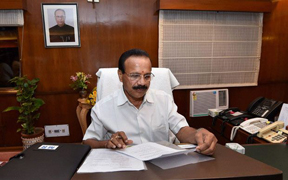 NEW DELHI: With many proposals getting stuck due to inter-ministerial litigations, government is bringing a new policy to ensure that departments do not sue each other and cases are settled through arbitration and reconciliation.
NEW DELHI: With many proposals getting stuck due to inter-ministerial litigations, government is bringing a new policy to ensure that departments do not sue each other and cases are settled through arbitration and reconciliation.
Along with the National Litigation Policy that the government plans to bring, the ministries and departments are being encouraged to amend laws to reduce court cases.
In this direction, the Finance Ministry is likely to amend the Negotiable Instruments Act to reduce burden on courts with regard to litigations related to cheque bounce cases.
The Transport Ministry is also likely to amend the Motor Vehicles Act to reduce litigations related to challans.
Giving this information here, Law Minister D V Sadananda Gowda also said the draft of the new policy will be taken to the Cabinet after feedback from various ministries.
The proposed policy makes it clear that government departments should avoid going to court against each other. It also states that courts should only be approached once the government department is fully satisfied that litigation is the only resort left, Gowda told a press conference.
He said government also proposes to amend the Arbitration Act with an aim of making India an arbitration hub. “After enhancing cap on FDI, we think the Act needs to be amended and India can become a hub of international arbitration,” Gowda said.
The plan to bring a litigation policy was initially mooted by then Law Minister M Veerappa Moily in UPA II period but it could not take off.
Though there are no official figures available as of now, Law Ministry believes that government is a litigant in 46 per cent of the cases in higher judiciary. As in 2010, 57,179 cases were pending in the Supreme Court and 42,17,903 were pending in the 24 High Courts at the end of 2011.
With regard to increasing the strength of High Court judges, government will “take up as soon as possible” a bill to enhance the retirement age of HC judges from 62 to 65 to bring it at par with the retirement age of Supreme Court judges, Gowda said.
The UPA government had in 2010 introduced a Constitutional amendment bill in this regard. But it could not come up for discussion in the Lok Sabha and it lapsed following the dissolution of the 15th Lok Sabha.
The Law Minister said the government has cleared enhancing the strength of High Court judges by 25 per cent from 906 to 1112 and the Chief Justice of India has approved the proposal.
He said High Courts have also been requested to encourage judicial officers of lower courts to settle disputes using means of mediation.
The 13th Finance Commission would have more funds to create additional mediation centers so that the load can be taken off regular courts, Gowda added.
Responding to a question on demands to have regional benches of the Supreme Court, Secretary (Justice) Kusumjit Siddhu said the apex court has already rejected a similar proposal some time back.
A fresh application by a private person is pending with the government and it will take a call on the issue in the coming days, Siddhu said.
Gowda also confirmed a proposal to amend the Lokpal Act and the Delhi Special Police Establishment Act, which governs CBI, to ensure that there is no requirement of quorum in the respective selection panels for choosing the anti-corruption ombudsman or the CBI chief.
He said the government is also amending the DSPE Act to make way for the Leader of the single largest opposition party in the Lok Sabha as a member of the selection committee in the absence of a recognized Leader of the Opposition in the lower house.
The Minister said government plans to create Commercial Divisions in High Courts to deal with high value disputes after a report from the Law Commission is received in this regard. A similar bill moved by the UPA government could be passed.–PTI






